Ristretto Nicolai
 Thursday, January 12, 2012 at 10:53AM
Thursday, January 12, 2012 at 10:53AM If you are someone who really likes coffee, the opening of a new specialty café in town is big news. On a quiet Sunday morning, Jinsu Lee (who shares a passion for good coffee and café experiences) and I went on a mission to find the new Ristretto Roasters café. Having not spent much time in that part of Northwest PDX, we were unsure about where to go, especially when we arrived at a large brick building with “Schoolhouse Electric Company” painted on the side. The multi-story brick structure looked like an old factory. It was surrounded by industrial and commercial buildings, with no houses or condos in sight. A freight train grumbled heavily by as we pulled up to park.
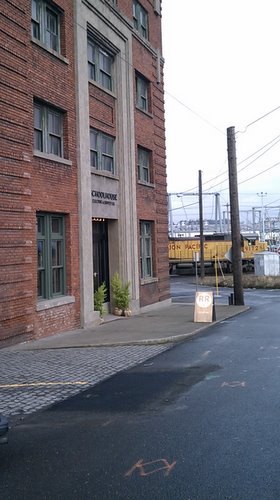
At first, we saw no indications of the café. After a bit of hesitation and wandering around in the street, though, we noticed the RR sign on the sidewalk. We were at the right spot after all.
Walking in, my first impression of the café was Wow – beautiful! Who would have thought a great café would exist here?
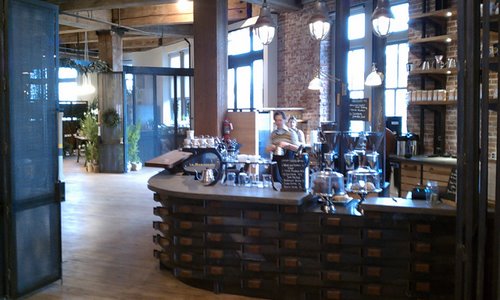
According to Ryan Cross, distribution manager for Ristretto (who happened to be working as a barista that day), the Schoolhouse Electric building was indeed an old factory, but it had served as an office building for several years, stuffed full of low ceilings and claustrophobic cubicles. No longer. The developer completely gutted the building for the renovation, throwing out the cubicles, getting rid of the false ceilings, and pulling plaster off the walls to expose the brick underneath. The space now has the feel of a cathedral, a cathedral of coffee.
The large windows that used to provide light for factory workers’ days now gives the café a light, open feel. The bright, airy feel of the café is juxtaposed against the imposing power of the massive wood pillars and beams that give strength to the space.
Accelerated Development, the same company that designed Coava’s Grand Avenue café space, also designed the new Ristretto Roasters café. You can see some similarities in the modern-retro-industrial chic design. It is an example of industrial elegance.
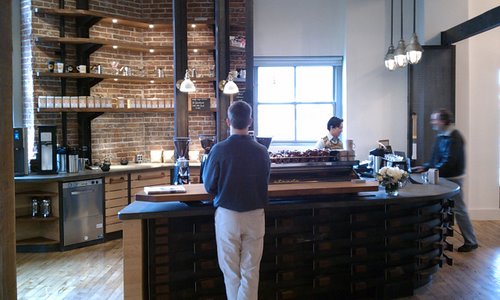
A shiny new La Marzocco Strada espresso machine sits on the gracefully curved coffee bar, gleaming under the warm lights hanging overhead. Behind the bar, a legion of six(!!!) grinders stood ready to grind. Three were dedicated to coffees for pourovers, three were for espressos – one blend, one single-origin, and one decaf. A plethora of choices for most coffee drinkers, but a coffee wonderland for a pursuer of great coffee.
I tried two different coffees. The first was a pourover of a natural-processed coffee from El Salvador. The deep, fruity aroma preceded the sweet, medium-bodied coffee. The second coffee was an espresso of an East Timorese coffee. It was rather savory.
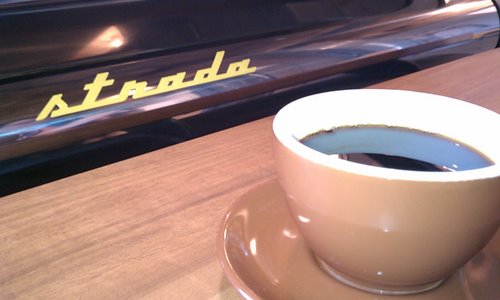
In addition to drinking coffee, we also got a lesson on some of the finer points of barista know-how. Cross gave us a close-up view of how the Strada works. The Strada is a high-tech machine with accurate temperature and pressure controls. The variable control paddles on the Strada are very sensitive, allowing the barista to precisely control the pressure, speed and intensity of the extraction. Cross showed us how he was pulling the espresso shots using a bottomless portafilter (no pour spouts). By taking off the spouts, he made it easier to spot any “channeling” through the filter.
Channeling is the phenomenon where water passes through the puck in small “channels” instead of filtering evenly through the coffee. One way to envision channeling is to think of the ground espresso as if it were the soil in a garden. When you water a garden, you want the water to sink evenly into the soil. Otherwise, the water will run together and form a trench (channel) in one part of the garden. The excess water washes the soil away and you lose both water and nutrients when this happens.
Baristas want the water to evenly pass through all of the ground espresso in order to produce an extraction that pulls out the best flavors inside the coffee. When coffee channels, too much water passes through the grounds too quickly, causing overextraction in that part of the puck. Pulling a shot with a bottomless filter gives the barista a quick visual check on the evenness of the grind and the tamp. He or she can see if the coffee is coming out from one part of the bottom of the filter or if it is coming out evenly.
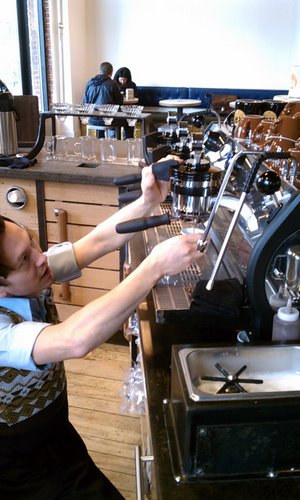
The new café shares a space with the Schoolhouse Lighting Company, a home décor store that takes used industrial equipment and gives it a new twist, fashioning it into usable home décor. Ristretto’s décor blends seamlessly into the space.
The café seemed isolated from any residential neighborhoods, farther away from houses than cafés usually are. Cross explained that when the building’s developer held an event to celebrate the renovation, Ristretto ran a pourover bar to serve coffee for the event. The developer was impressed, and he encouraged Ristretto’s owners to set up a café there, setting the wheels in motion. Northwest Portland residents should be glad they did.
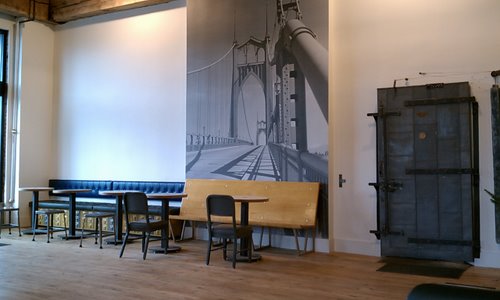 Is that a card catalog over there under the bench?
Is that a card catalog over there under the bench?
Ristretto on Nicolai would make a great stop for coffee if you are in the Northwest area. The space is beautiful and the coffee, some of Portland’s finest. Not everyone who goes in will want to learn about the intricacies of the espresso extraction process, but everyone who visits the newest Ristretto will be able to sit and enjoy great coffee in a beautiful space.
Vitals
Address: 2181 NW Nicolai, Portland, OR 97210 (map)
Phone: 503-227-2866
Hours: Monday-Friday 6am-6pm
Saturday 8am-6pm
Sunday 8am-4pm
Coffee: Ristretto
Wi-Fi? Yes, I believe so.
Recommendations? Ask what’s on grind…
Website: www.ristrettoroasters.com



Reader Comments (1)
I went here the other day and had some pour over. Such good coffee and a really neat space. I live on NW Raleigh now and never realized anything really existed on the other side of thurman. What a good find Will, Thanks!